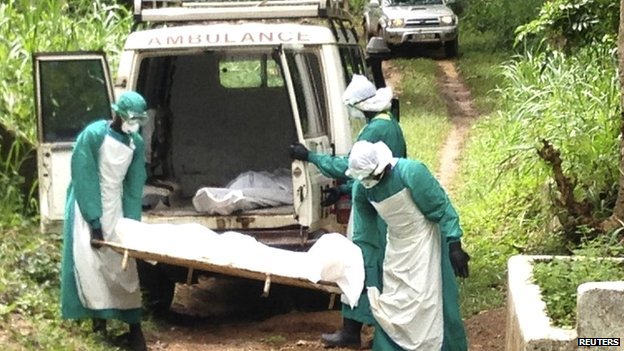A hunt has been launched in Sierra Leone’s capital, Freetown, for a woman with Ebola who was forcibly removed from hospital by her relatives.
Radio stations around the country are appealing for help to find the 32-year-old who is being described as a “risk to all”.
She is the first Freetown resident to have tested positive for the virus.
Since February, 660 people have died of Ebola in three West African states – the world deadliest outbreak to date.
It began in southern Guinea and has since spread to Liberia and Sierra Leone.
Meanwhile, Nigerian health officials say a Liberian man admitted to a hospital in Lagos, who had been kept under quarantine, has died of suspected Ebola.
Angry protesters
The virus kills up to 90% of those infected but if patients receive early treatment, they have a better chance of survival.
It spreads through contact with an infected person’s bodily fluids.
WHO: Latest West Africa Ebola outbreak figures

- Guinea – 314 deaths, 415 cases
- Liberia – 127 deaths, 224 cases
- Sierra Leone – 219 deaths, 454 cases
Sidi Yahya Tunis, a spokesperson for Sierra Leone’s ministry of health, said the King Harman Road Hospital was stormed by the Ebola patient’s family on Thursday.
The BBC’s Umaru Fofona in Freetown said the woman, who is an apprentice hairdresser, is a resident of the densely populated area of Wellington in the east of the city.
The Ebola cases in Sierra Leone are centred in the country’s eastern districts of Kenema and Kailahun, just over the border from the Guekedou region of Guinea where the outbreak started.
Our reporter says there is increasing anger and confusion over the handling of the outbreak.
Police say thousands of people have taken to the streets of Kenema to protest – thronging to the town’s hospital, which treats all Ebola cases in the district.
Other sources have told our correspondent that police have fired teargas to try and disperse the angry crowds.
Nurses at Kenema hospital went on strike for a day on Monday after three of their colleagues died of suspected Ebola.
Earlier this week, it was announced that the doctor leading Sierra Leone’s fight against Ebola was being treated for the virus.
On Thursday, the World Health Organization said that of the 660 deadly Ebola cases, 219 people had died in Sierra Leone.
Ebola virus disease (EVD)

- Symptoms include high fever, bleeding and central nervous system damage
- Fatality rate can reach 90%
- Incubation period is two to 21 days
- There is no vaccine or cure
- Supportive care such as rehydrating patients who have diarrhoea and vomiting can help recovery
- Fruit bats are considered to be the natural host of the virus
Source: BBC


